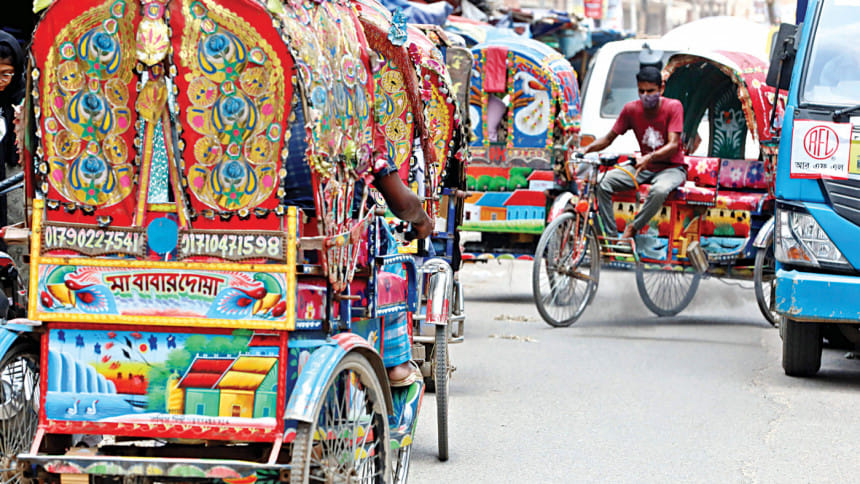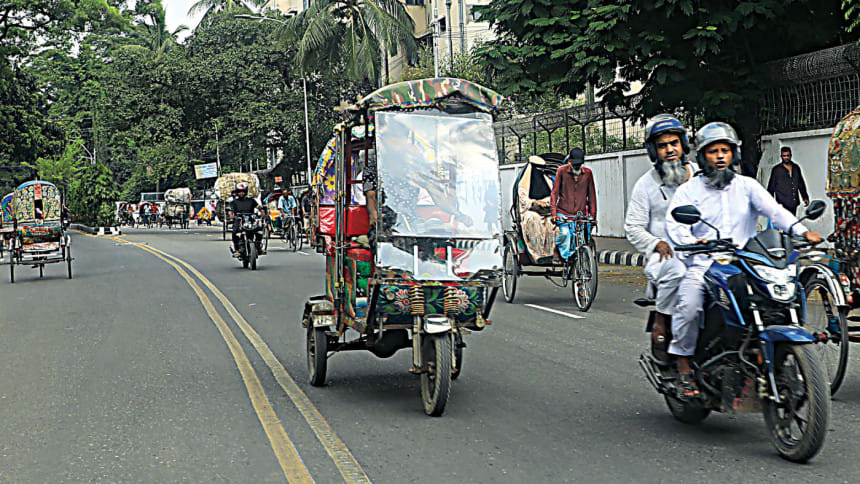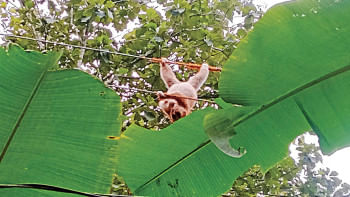Illegal rickshaws rule Dhaka streets

The rising number of illegal rickshaws remains one of the major reasons for the capital's traffic getting worse.
Experts say illegal operation of pedal and battery-powered rickshaws is prompting a section of local hoodlums, ruling party leaders, and law enforcers to extort hundreds of crores of taka.
The High Court in 2014 banned battery-run rickshaws in Dhaka and Chattogram. It had issued another directive on December 15, 2021, prohibiting the import of battery-run rickshaws. The number of such three-wheelers in the capital kept going up despite the orders.
"The government can earn good revenue by registering battery-run rickshaws. The money is now pocketed by local politicians, influential people and cops."
Interestingly, the Dhaka north and south city corporations, responsible for registering to pedal rickshaws, have no data on how many rickshaws are on the city streets.
The Dhaka North City Corporation (DNCC) has 30,162 registered rickshaws, while the figure is 1,90,217 for the Dhaka South City Corporation (DSCC).
A study carried out by the Bangladesh Institute of Labour Studies (BILS) in 2019 said that Dhaka had over 11 lakh pedal rickshaws, of which only three to four percent were registered.
Also, there were more than 2 lakh battery-run rickshaws in the city and transforming pedal rickshaws into battery-powered three-wheelers kept on rising back then, said the report.
It also revealed that a section of ruling party leaders, 25 organisations, and five societies had control of illegal rickshaws.
BILS now puts the number of rickshaws in the capital at more than 15 lakh.

Speaking to The Daily Star, BILS consultant Khandoker Abdus Salam said rickshaw pullers contribute Tk 30,000 crore every year to village economy.
"More than 50 lakh people pull rickshaws across the country to make their living. So, it is very important to bring them under regulation and register them based on zones," he said.
A study by Buet in 2022 found that Dhaka city traffic speed dropped to 4.5km per hour from 21km a decade ago despite the government spending a staggering Tk 28,000 crore to ease congestion.
Visiting different areas in the capital over the last few weeks, The Daily Star found that most of the rickshaws either did not have registrations or their registrations had expired.
During the day, battery-run rickshaws mainly ply different allays of the city, but those invade a large number of streets in the evening, making traffic worse.
Leaders of the Rickshaw Van Easybike Sramik Union said battery-powered rickshaws are operated using tokens or cards issued by local politicians and influential people under the banners of different organisations.
The battery-run rickshaw owners avail the tokens or cards every month for Tk 1,000 to Tk 2,500 for each three-wheeler.
In Jatrabari, Shyampur, Postagola, Wari, Sadarghat, Pallabi, Rupnagar, Bhasantek, Khilgaon, Magda, Manda, Maniknagar, and Kamrangirchar areas, battery-run rickshaws are controlled by different gangs and influential people, said Ariful Islam Nadim, joint secretary of the sramik union.
All these gangs and influential people have police backing, he claimed.
In Dhaka's posh areas like Gulshan, Banani, Baridhara, DOHS, and Bashundhara Residential Area, rickshaws are controlled by the neighbourhoods concerned, and a rickshaw puller needs to pay Tk 12,000-15,000 to have permission from those neighbourhoods, BILS study said.
Ariful blamed the two city corporations for the high number of illegal rickshaws, saying that they do not register new rickshaws.
"The government can earn good revenue by registering battery-run rickshaws. The money is now pocketed by local politicians, influential people and cops," he said.
Jabbar Miah, a rickshaw puller from Jatrabari, said he drives a battery-run-rickshaw because it can be driven with less physical labour than a pedal rickshaw.
"I can make about Tk 1,000 a day. But I need to pay Tk 2,000 a month for the token."
Nazir Amin, another rickshaw puller from Kamrangirchar, said he pays a Tk 2,300 a month to a man who controls the business.
"If police catch my rickshaw, I have to pay them Tk 1,200 to get it back. If a rickshaw puller cannot not pay the amount, his battery-run rickshaw gets dumped [impounded]," he said.
Transport expert Prof Hadiuzzaman said the increasing number of rickshaws have been worsening traffic in the capital over the years.
"If non-motorised vehicles keep on increasing, it will only aggravate the traffic as the streets are not becoming wider," he told this correspondent on Wednesday.
Hadiuzzman, also a teacher of civil engineering at Buet, said rickshaws should be given registration numbers after improving the registration system.
"If the rickshaws were registered, the government would earn revenue and widespread extortion of rickshaw pullers would stop."
He suggested adopting a comprehensive policy for granting route permits and registering rickshaws, and arranging training for the rickshaw pullers.
The expert said steps should be taken to regulate battery-run rickshaws.
"These rickshaws should be allowed to operate on specific routes after registration. Besides, such rickshaws should be modified to make them suitable for certain roads as there are many weaknesses in those, including the braking system," he said.
He said the BRTA is not capable of registering such a large number of battery-run rickshaws.
DNCC Public Relations Officer (PRO) Mokbul Hossain said they have developed a comprehensive plan to ensure discipline in operating pedal rickshaws in the DNCC area.
"The plan is currently awaiting approval from the Local Government Engineering Department," he said.
Mokbul said the corporation will issue digital number plates with QR codes to pedal rickshaws to prevent the reuse of previous number plates. He, however, did not mention the time when they would introduce the system.
He could not confirm when they would renew the pedal rickshaw registrations and what actions would be taken against the illegal ones.
The DNCC official said their magistrates carry out drives occasionally against battery-run rickshaws.
DSCC PRO Abu Naser said that they have renewed the registrations of rickshaws recently.
"We have developed an app, which can scan QR codes, to access the information of registered rickshaws."
He said the city corporation was carrying out campaigns to make people aware of the risks of battery-run rickshaws, and to discourage them from using those.
Md Monibur Rahman, additional police commissioner (traffic) of Dhaka Metropolitan Police, said they have already freed some major roads from pedal rickshaws to ease congestion.
"We are conducting drives against battery-run rickshaws. Our efforts are underway to bring discipline to the city streets," he said.
Regarding allegations of some police officers taking bribes to allow battery-run rickshaws on roads, the DMP official said they have taken steps against those involved based on evidence, and they would continue to do so.
BRTA Director Mahbub-E-Rabbani said they are against allowing battery-run rickshaws on the streets as those pose high risks.
"If a pedal rickshaw is converted into a motorised one, it won't be safe," he added.
Buet teacher Hadiuzzman recommended making more public transport available on the major roads, including highways.
"If this can be done, the trend of rickshaws on major roads would be down and the accidents involving battery-run rickshaws would decrease significantly," he said.

 For all latest news, follow The Daily Star's Google News channel.
For all latest news, follow The Daily Star's Google News channel. 



Comments